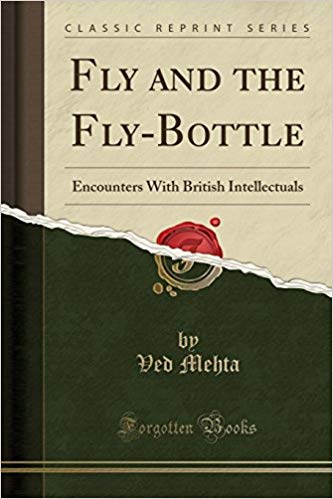Good Reads meta-data is 269 pages rated 3.9 by 16 litizens.
Genre: Non-fiction.

Verdict: A golden oldie.
A charming memoir of meetings with the lions of the British academic establishment at a time when the BBC gave them air time, parliamentarians asked them for audiences, and newspapers welcomed their words. The charm is in Mehta and not his interlocutors.
The subtitle is ‘Encounters with British Intellectuals,’ however all but two of his respondents were ensconced in academia. Few seemed troubled by teaching duties.
The book divides, more or less, into two parts. The first is a series of interviews with British philosophers like A. J. Ayer, Peter Strawson, and their ilk. The second is a parallel series of interviews with British historians, like Arnold Toynbee, A. J. P. Taylor, and the egregious Hugh Trevor-Roper (who went from strength to strength on ever so little), though he is rivalled by E.H. Carr for hubris.
It was indeed a small world since three-quarters of the beasts were in the Oxford zoo, with the remainder, bar a couple, in its Cambridge annex. Small, yes, and all the more venomous for it. The back-biting, the undermining swim beneath surface of the scathing public reviews of each others’ works and days. The pages of ‘Encounter,’ the ‘Listener,’ and the ‘Times’ positively bristled with their poisoned barbs.
It was all so monumentally unimportant that today it is all but forgotten, and a good thing, too. Yet the Platonic dialogues that they despised are still studied.
I loved the story of Hughie writing a long and venomous review of one of Taylor’s books and publishing it with much fanfare in ‘Encounter,’ and then sitting back in the expectation of a rejoinder from Taylor that he could reply to in another vituperative essay in ‘Encounter.’ Taylor did not bother to reply. What a deflation that much have been, like not making Richard Nixon’s Enemies List, despite all efforts!
Among the philosophers the major issue of interest to the laity is the conundrum of free will versus determinism, or in social sciencese: structure versus agency. Among the historians the parallel divide is between meaningful and accidental events.
Amid the nonsense and petty bickering made out to be something much more, there are many telling shafts. I liked historian Herbert Butterfield’s conviction that in teaching history (and political science) one is teaching future officials, diplomats, traders, tariff managers, entrepreneurs, bureaucrats, and so one must equip them to respond to the challenges they will face outside the classroom. Predictably when he uttered this view of academic responsibility in a public lecture he called down the wraith of the gowned gods upon his head who went on about their art for their art’s sake. As if. Few were troubled by teaching duties since they had very few.
Mehta’s ever so oblique and sly digs at his prestigious prey are desiccated. While much of their posturing is, well, posturing, it is well to remember that R. M. Hare’s arid ‘The Language of Morals’ (1951) was drafted while he was in a Japanese Prisoner of War camp in Malaya. However, few of his contemporaries can lay claim to such courageous conviction.
The title is one of the bon mots Ludwig Wittgenstein tossed off, namely, that the task of philosophy was to lead the fly (us) out of the fly bottle (?). Every remark by this sage is totemic to acolytes, so there are many disputed interpretations of this aside, which Ludi no doubt forgot as soon as he said it.
Here is a sampler of the dross and the ore.
Richard Hare dismissed Continental philosophy holus-bolus opining that philosophy can only be taught by the tutorial method (51). Since that method was only used at Oxford and Cambridge it followed only graduates of those universities can be philosophers. He seemed to accept that conclusion when Mehta put it back to him. Since it has only been used there for a short time, there were no philosophers before that. Got it? Ergo Plato, Hegel, Sartre, Schlick, Rawls, and so on are not philosophers.
Wittgenstein thought of himself as a living philosophical problem (82). Amen. Wittgenstein thought only of himself full stop.
J. L. Austin’s linguistic philosophy spread throughout the dominions and America, but not in England because Austin admitted too students from those places (85) [not on its merits], said one don in a huff. It is certainly true that it dominated the curriculum in my undergraduate and graduate education.
Mehta asked E. H. Carr to name historians he admired. ‘None’ was his reply (133). Well, one might suppose there was one, ‘E. H. Carr’ by name.
Taylor wrote, with prescience, of a world where emotions have replaced reason and hysteria has become meritorious (177). He foretold Fox News and President Tiny.
Another bon mot from Taylor: Perfection is always sterile (184). That might be the motto of utopia.
This traipsing through the groves comes to an abrupt stop. But then how could it end. Mehta adds a page and half at the end, drawing no conclusions. These essays were commissioned by the New Yorker and do not quite make a book. What Mehta does not tell the reader is that he became blind in India at four years old. There are a dozen or so of his titles on Amazon.
I read this on paper in the Forgotten Books reprint as picture above. That edition is not recommended because of missing text and omitted pages. I think I may have read some of it in graduate school as relief from analytic and linguistic philosophy.
By coincidence I started to read Robert Harris’s ‘Selling Hitler: The Story of the Hitler Diaries’ where Hugh Trevor-Roper again figures. Egregious to the last. The excuses are many and the facts are immutable.
Skip to content
